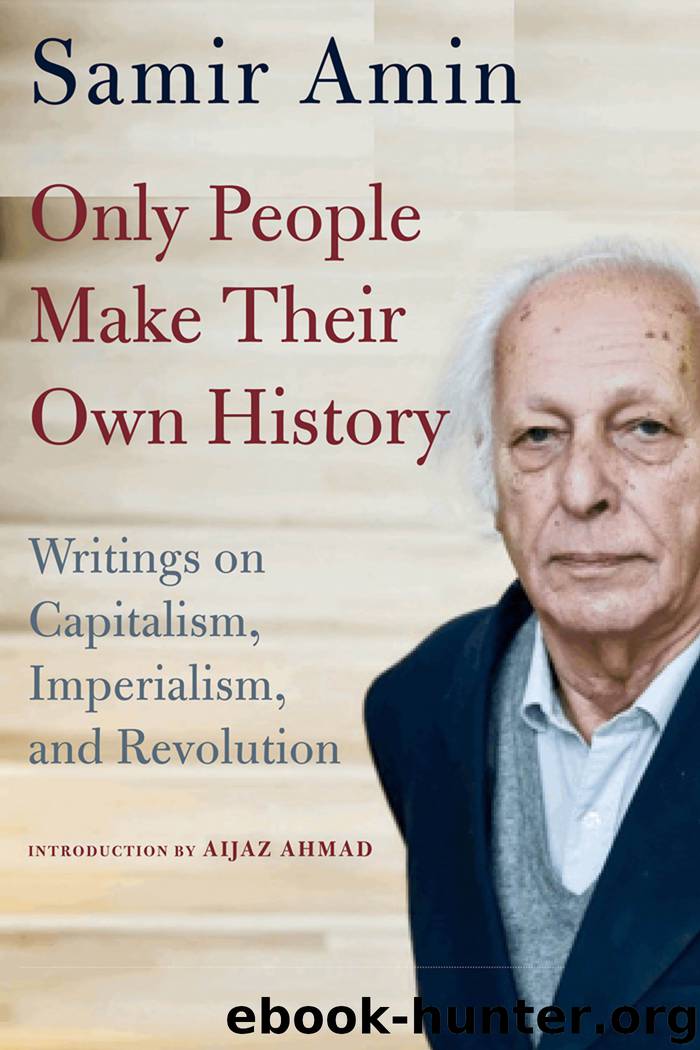Only People Make Their Own History by Samir Amin;

Author:Samir Amin;
Language: eng
Format: epub
Publisher: New York University Press
Published: 2019-03-09T16:00:00+00:00
GREAT SUCCESSES, NEW CHALLENGES
China has not just arrived at the crossroads; it has been there every day since 1950. Social and political forces from the right and left, active in society and the party, have constantly clashed.
Where does the Chinese right come from? Certainly, the former comprador and bureaucratic bourgeoisies of the Guomindang were excluded from power. However, over the course of the war of liberation, entire segments of the middle classes, professionals, functionaries, and industrialists, disappointed by the ineffectiveness of the Guomindang in the face of Japanese aggression, drew closer to the Communist Party, even joining it. Many of them—but certainly not all—remained nationalists, and nothing more. Subsequently, beginning in 1990 with the opening to private initiative, a new, more powerful, right made its appearance. It should not be reduced simply to ‘businessmen’ who have succeeded and made (sometimes colossal) fortunes, strengthened by their clientele—including state and party officials, who mix control with collusion, and even corruption.
This success, as always, encourages support for rightist ideas in the expanding educated middle classes. It is in this sense that the growing inequality—even if it has nothing in common with inequality characteristic of other countries in the South—is a major political danger, the vehicle for the spread of rightist ideas, depoliticization, and naive illusions.
Here I shall make an additional observation that I believe is important: petty production, particularly peasant, is not motivated by rightist ideas, like Lenin thought (that was accurate in Russian conditions). China’s situation contrasts here with that of the ex U.S.S.R. The Chinese peasantry, as a whole, is not reactionary because it is not defending the principle of private property, in contrast with the Soviet peasantry, whom the communists never succeeded in turning away from supporting the kulaks in defence of private property. On the contrary, the Chinese peasantry of petty producers (without being small property owners) is today a class that does not offer rightist solutions, but is part of the camp of forces agitating for the adoption of the most courageous social and ecological policies. The powerful movement of ‘renovating rural society’ testifies to this. The Chinese peasantry largely stands in the leftist camp, with the working class. The left has its organic intellectuals and it exercises some influence on the state and party apparatuses.
The perpetual conflict between the right and left in China has always been reflected in the successive political lines implemented by the state and party leadership. In the Maoist era, the leftist line did not prevail without a fight. Assessing the progress of rightist ideas within the party and its leadership, a bit like the Soviet model, Mao unleashed the Cultural Revolution to fight it. ‘Bombard the Headquarters’, that is, the Party leadership, where the ‘new bourgeoisie’ was forming. However, while the Cultural Revolution met Mao’s expectations during the first two years of its existence, it subsequently deviated into anarchy, linked to the loss of control by Mao and the left in the party over the sequence of events. This deviation led to the state and party taking things in hand again, which gave the right its opportunity.
Download
This site does not store any files on its server. We only index and link to content provided by other sites. Please contact the content providers to delete copyright contents if any and email us, we'll remove relevant links or contents immediately.
| Anarchism | Communism & Socialism |
| Conservatism & Liberalism | Democracy |
| Fascism | Libertarianism |
| Nationalism | Radicalism |
| Utopian |
The Secret History by Donna Tartt(18090)
The Social Justice Warrior Handbook by Lisa De Pasquale(11944)
Thirteen Reasons Why by Jay Asher(8420)
This Is How You Lose Her by Junot Diaz(6412)
Weapons of Math Destruction by Cathy O'Neil(5803)
Zero to One by Peter Thiel(5464)
Beartown by Fredrik Backman(5312)
The Myth of the Strong Leader by Archie Brown(5219)
The Fire Next Time by James Baldwin(4998)
How Democracies Die by Steven Levitsky & Daniel Ziblatt(4943)
Promise Me, Dad by Joe Biden(4900)
Stone's Rules by Roger Stone(4836)
100 Deadly Skills by Clint Emerson(4670)
Rise and Kill First by Ronen Bergman(4537)
A Higher Loyalty: Truth, Lies, and Leadership by James Comey(4535)
The David Icke Guide to the Global Conspiracy (and how to end it) by David Icke(4363)
Secrecy World by Jake Bernstein(4360)
The Farm by Tom Rob Smith(4308)
The Doomsday Machine by Daniel Ellsberg(4234)
